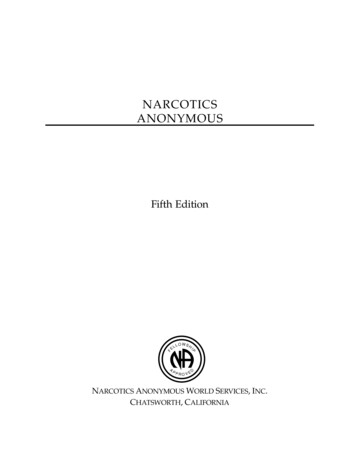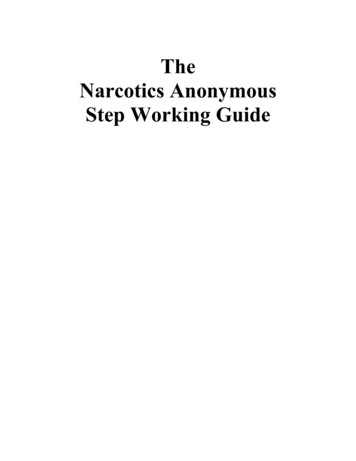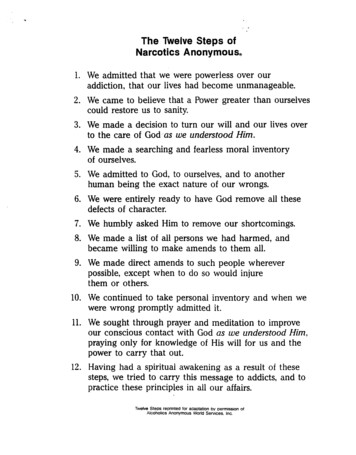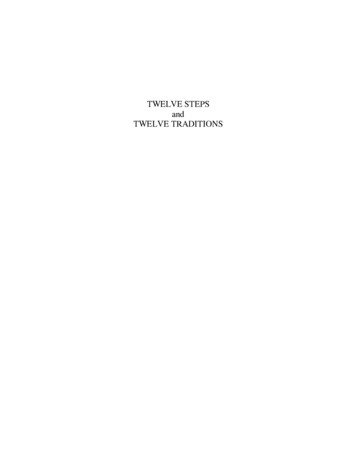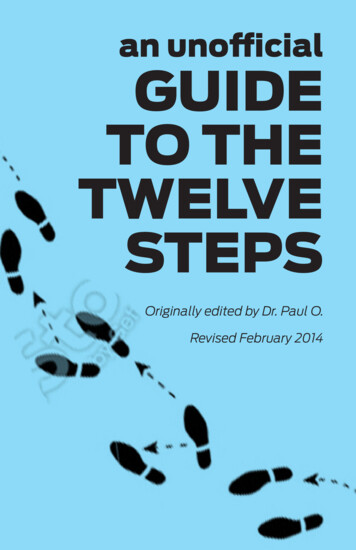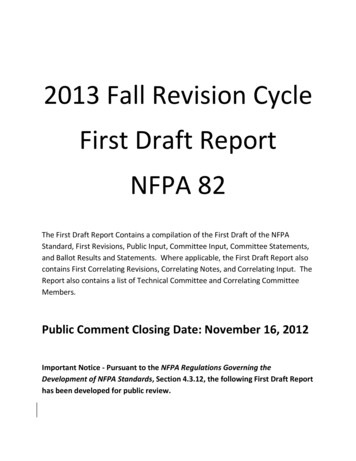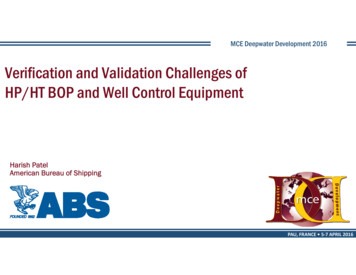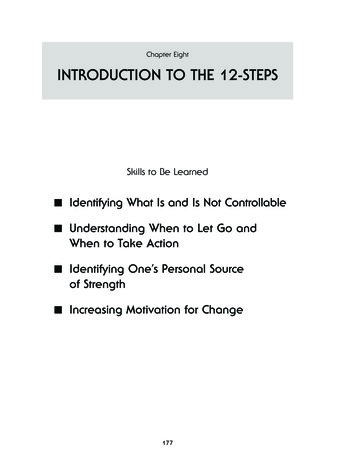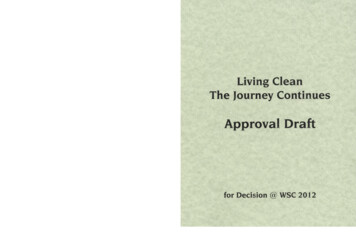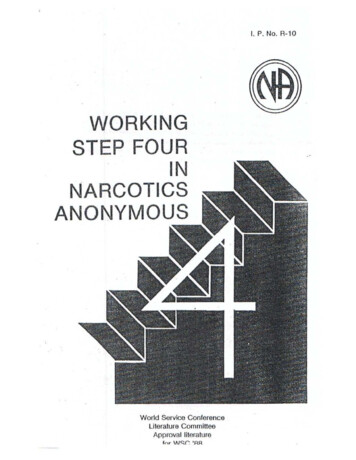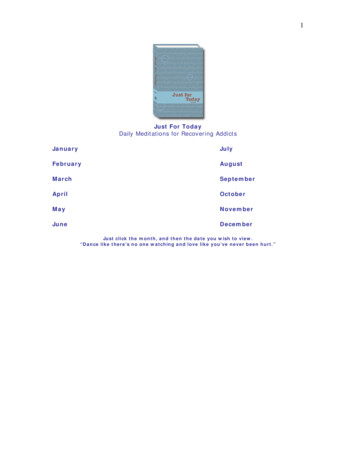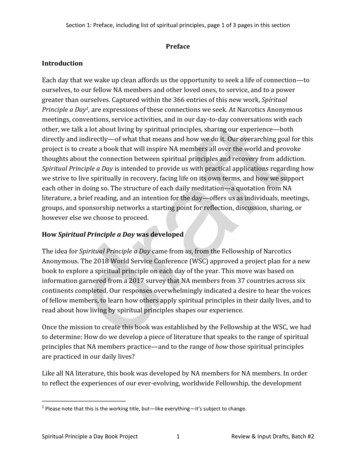
Transcription
Section 1: Preface, including list of spiritual principles, page 1 of 3 pages in this sectionPrefaceIntroductionaftEach day that we wake up clean affords us the opportunity to seek a life of connection—toourselves, to our fellow NA members and other loved ones, to service, and to a powergreater than ourselves. Captured within the 366 entries of this new work, SpiritualPrinciple a Day1, are expressions of these connections we seek. At Narcotics Anonymousmeetings, conventions, service activities, and in our day-to-day conversations with eachother, we talk a lot about living by spiritual principles, sharing our experience—bothdirectly and indirectly—of what that means and how we do it. Our overarching goal for thisproject is to create a book that will inspire NA members all over the world and provokethoughts about the connection between spiritual principles and recovery from addiction.Spiritual Principle a Day is intended to provide us with practical applications regarding howwe strive to live spiritually in recovery, facing life on its own terms, and how we supporteach other in doing so. The structure of each daily meditation—a quotation from NAliterature, a brief reading, and an intention for the day—offers us as individuals, meetings,groups, and sponsorship networks a starting point for reflection, discussion, sharing, orhowever else we choose to proceed.How Spiritual Principle a Day was developeddrThe idea for Spiritual Principle a Day came from us, from the Fellowship of NarcoticsAnonymous. The 2018 World Service Conference (WSC) approved a project plan for a newbook to explore a spiritual principle on each day of the year. This move was based oninformation garnered from a 2017 survey that NA members from 37 countries across sixcontinents completed. Our responses overwhelmingly indicated a desire to hear the voicesof fellow members, to learn how others apply spiritual principles in their daily lives, and toread about how living by spiritual principles shapes our experience.Once the mission to create this book was established by the Fellowship at the WSC, we hadto determine: How do we develop a piece of literature that speaks to the range of spiritualprinciples that NA members practice—and to the range of how those spiritual principlesare practiced in our daily lives?Like all NA literature, this book was developed by NA members for NA members. In orderto reflect the experiences of our ever-evolving, worldwide Fellowship, the development1Please note that this is the working title, but—like everything—it’s subject to change.Spiritual Principle a Day Book Project1Review & Input Drafts, Batch #2
Section 1: Preface, including list of spiritual principles, page 2 of 3 pages in this sectionprocess included as many NA members as possible—as many and as diverselyrepresentative of our Fellowship as have elected to participate. Participants in the processwere geographically, linguistically, and culturally diverse, as well as varied in terms ofcleantime and spiritual practices.aftThe entries in this volume are derived from thousands of pieces of materials submitted byindividual NA members, meetings, and groups, and from Spiritual Principle a Dayworkshops and activities all over the globe. A workgroup comprised of a diverse group ofNA members was convened to deliver on the specifics of the Fellowship’s requests for thenew book, to select quotations from NA literature related to each spiritual principle, to readall of the submissions from members, and to identify the elements that would be woventogether to create the fabric of this book. Writers, also NA members, were engaged todevelop and creatively refine the entries, based on workgroup, World Board, andFellowship review and input. Drafts of all entries, plus the list of spiritual principlesincluded in this preface, were posted online so that individual members and groups couldprovide feedback on the direction of the work being conducted by the workgroup. Theentire process, from conception to production, took more than four years.drThese pages contain the results of this process. This is NA unity in action. The entriesexemplify what spiritual principles mean to NA, giving practical, relatable reflections onhow to apply them in our daily lives, both in and out of the rooms. Our Fellowshipenvisioned a well-rounded and broadly appealing book in which individual entries servedifferent functions—inspirational, educational, heartwarming, humorous, and real. Thiseclectic approach means that not all entries will resonate with everyone, but it ensures thatall of us will see ourselves somewhere in this book. These are our stories, our experiences,our voices.Applying Spiritual Principle a Day in our recoveryBased on the Fellowship’s recommendations, we have structured Spiritual Principle a Dayas a “daily meditation” book, similar to Just for Today (JFT). Each page highlights a spiritualprinciple with a quotation from our body of NA literature. The excerpt is followed by ameditation on the principle and a reflection for the day.What we do with these words on the page is entirely up to us. The choices are varied,perhaps as varied as we are. Sure, using the written intention at the end of each page toinspire our personal meditation practice is an option, but it’s one of many.Spiritual Principle a Day is a labor of love intended to meet each of us exactly where we arein the moment when we pick up the book. We can start a Spiritual Principle a Day meeting,Spiritual Principle a Day Book Project2Review & Input Drafts, Batch #2
Section 1: Preface, including list of spiritual principles, page 3 of 3 pages in this sectionjust like we’ve done for Living Clean, JFT, or Guiding Principles. We can use it to start or endour day with meditation practice, or writing, or prayer. We can use it to connect to ourHigher Power in some way. We can share about it with sponsees to help broaden their (andour) understanding of how a particular spiritual principle is affecting our lives at any givenmoment. Want to focus on one spiritual principle for an entire week? Find it in the listbelow and get ouragementHowever we choose to read this daily meditation book, we hope that each of us findssomething in these pages that we identify with, empathize with, strive toward, and aspireto. We can all expect to learn a lot from each other as we find creative approaches to engagewith Spiritual Principle a Day.Spiritual Principle a Day Book Project3Review & Input Drafts, Batch #2
Section 2: Six entries on “balance”Balance, Entry #1 of 6We need to strike a balance between being in denial of our feelings and lettingthem overwhelm us; we don’t want to go to either extreme (NA Step WorkingGuides, Step Ten, “Feeling versus Doing”).“In recovery, it’s not our feelings that matter; it’s our actions.”We hear some version of this NA bumper sticker in meetings pretty often. Doing the “right”thing, even when that action contradicts how we’re feeling, is certainly a shared valueamong many members. But, should we just leave feelings unexpressed—especially thosethat come with a lot of baggage, such as anger, fear, and shame? Nope. Consciously or not,we’ll eventually let those feelings seep out, weaponizing them against ourselves or others.aftStriking a balance between suppressing our feelings and being emotionally overwhelmeddoesn’t look the same on all recovering addicts. Many of us are emotional projectiles;anything will set us off, and anyone in our path will also feel the burn. For others, avoidanceis our strategy: We’d rather deny, deny, deny.In meetings, we also hear: “Feelings aren’t facts.” And while it’s true that we should takecaution when letting our emotions drive our actions, we should not deny that feelings arereal. They are also temporary, which is why other members may suggest we take a pause,breathe, scream into a pillow, and/or talk about how we’re feeling with another addict.drSeeking emotional balance is a practice, not a state of being we arrive and stay at. As withall aspects of recovery, there’s no perfect way to negotiate and monitor our practice ofemotional balance. We aren’t self-programming robots that can curate a perfectly authenticset of emotions that don’t swing too far in any unreasonable direction. Lucky for us andthose around us, we are clean, and we can lean on the tools of NA to help keep us fromimploding or exploding.-----------------------------------I will make a practice of expressing my very real feelings in a productive wayand not letting them force my actions.Spiritual Principle a Day Book Project4Review & Input Drafts, Batch #2
Section 2: Six entries on “balance”Balance, Entry #2 of 6We remember to put our program first, and to respect our own limits. We striveevery day to keep ourselves spiritually balanced (Living Clean, Chapter 3,“Conscious Contact”).Addicts, in and out of recovery, are subject to thinking and acting in extremes. Many of usdiscover a need for personal limits by overdoing things. Even in recovery, sometimes toomuch of a good thing is just too much. One member shared, “I spent twelve hoursvolunteering in our convention’s merchandise room. It seemed like a good idea at the time,but it was every bit as stressful as my most hectic work days. Looking back, I realized that Ihad misunderstood what it meant to put my program first.”aftThe common advice to put our program first isn’t meant to shame us into giving and givingand giving some more. Maybe we take one shift in the merchandise room, hell, even two, butwe certainly do not need to take on six shifts at the expense of our sanity. While service is akey component to our recovery, balance requires us to pay attention to so much more.Spiritual maintenance takes time and commitment.drMany of us develop routines that help keep us spiritually centered. They become the heartof our personal recovery and the wellspring for our spiritual balance. We commune with aHigher Power in whatever ways work for us. We “listen” by quieting our mind in meditation,by taking a motorcycle out on a winding road, or listening to newcomers at a chai shop beforethe meeting. We share our hopes and our pain with other members, a journal, or with theuniverse.When we keep a balanced program at the center of our lives, we’re better equipped tonavigate life on life’s terms. Practicing balance doesn’t mean that we’re spiritually attuned atall times; rather, it means that we notice when we’re out of tune, and we take action to correctour course.-----------------------------------I will listen to my body, mind, and spirit to establish my own limits and explorehow I tune into spiritual balance in my recovery.Spiritual Principle a Day Book Project5Review & Input Drafts, Batch #2
Section 2: Six entries on “balance”Balance, Entry #3 of 6Each of us seeks our own balance that allows us to participate in the worldwithout sacrificing our recovery or putting ourselves at risk (Living Clean,Chapter 5, “Bridging Two Worlds”).Imagine life as a pie chart. The sections of this pie represent the different arenas of ourlives. We have a portion for Narcotics Anonymous and sections for family, friends, work,our community, our interests, and a multitude of categories we could add to this list. Whilewe often hear that recovery should be our priority, maybe even the biggest segment,there’s no prescribed ideal balance for how much time we dedicate to NA versus the worldoutside of NA.aftWhile we were using, our addiction took up most of the pie, and everything else was asliver. For a lot of us, when we’re new in the program, NA becomes the lion’s share of ourchart. As newcomers, we tend to stick very close to the Fellowship, because it’s suggestedby our sponsor and other members—and because NA is where we begin to find comfortand safety in being who we are.drBut as we transform in recovery, our lives tend to fill up. Our pie chart diversifies! Eventhough our aim may be to sustain the same level of participation in meetings and Steps andservice, there are only so many hours in a day—and space in our chart. As we seek tomaintain balance in our busy lives, we may find ourselves obsessing about one area andneglecting others.No matter what we have going on, we have to remember that our number one prioritymust be to stay clean, or we risk losing the rest of the pie as along with our cleantime.We can seek the balance we need without worrying about perfecting it. We can learn howto assess when things are off-kilter, and a dose of the NA basics is needed. We can adapt asthe demands of our lives keep shifting. We can enjoy a full life without posing unnecessaryrisks to our recovery.----------------------------------How’s my pie chart sectioned these days? How am I balancing my NA programwith my other responsibilities and pursuits?Spiritual Principle a Day Book Project6Review & Input Drafts, Batch #2
Section 2: Six entries on “balance”Balance, Entry #4 of 6So many things compete for our attention, and as addicts we have a tendency tothink in extremes: all or nothing, right or wrong. Finding the balance is anongoing negotiation (Living Clean, Chapter 1, opening section).What could possibly go wrong?tIn recovery, when our lives get “bigger,” our already questionable attention span is pulledin many different directions. We have our NA life, and we balance it with work life, schoollife, home life, family life, sex life, and more. On top of that, we are now able to address theconsequences of our using: improving our health, dealing with legal issues, making amends.And many of us are also pursuing other interests and goals that bring us joy. Through usingthe tools of the NA program, including prayer and meditation, we can maintain amanageable balance of all the above. We’re living by spiritual principles as much ashumanly possible. We’re sincerely grateful more often than we aren’t.afSometimes it’s a truly life-altering event that will throw us off-balance. Or maybe we makea mistake we can’t run from, or we don’t achieve something we’ve worked hard for and feelwe deserve. Other times, if it’s only that we spill a glass of water, we’ll want to smash theglass and drown ourselves in the water.drSeeking balance—both in terms of our inner life and how we spend our time—is anongoing negotiation. Reacting in extremes to our mistakes or to what we can’t control willwear us out and make us vulnerable to our disease. Just because we’re clean and doing welldoesn’t mean that life will consistently get better and better without fail. We can bevigilant, but we can’t prepare for everything. If we have our program as a base and aconstant in our lives, we will have spiritual principles, relationships, and a Higher Power tolean on when life inevitably shows up.Life is unpredictable and often chaotic. It’s the seeking of balance within the chaos that willhelp keep us clean and moving forward.----------------------------------I can commit to pursuing balance among all areas of my life. But it’s just asvital to my recovery that I accept life’s chaos—without adding to it.Spiritual Principle a Day Book Project7Review & Input Drafts, Batch #2
Section 2: Six entries on “balance”Balance, Entry #5 of 6Sometimes we get confused and think that to live spiritually means that we arehappy and get what we want, and that if we’re not happy or don’t get our way,something is out of balance. It would be nice if that were true, but recovery is nota fairy tale (Living Clean, Chapter 3, “Spirituality is Practical”).For many of us, our lives get so much better so quickly in the early years that it's onlynatural to think we've found the key to happiness, unencumbered by life's difficulties. It'snice while it lasts, but ultimately, as one member puts it: "Life is more than killing timebetween meetings, and I eventually experienced hardships despite working a pretty goodprogram." Life is not always fair—that's a fact. Sometimes we lose loved ones, homes, andrelationships even when we're spiritually centered.aftThe results of day-to-day life are not always what we would have hoped for. Nevertheless,we learn how to walk through situations by living according to spiritual principles. If wedon’t get the job we wanted, or a long-term relationship comes to an end, we hold on andstay clean. Our world may still be thrown out of balance from time to time, but as long aswe stay clean, we can survive sadness, disappointment, and uncertainty and return tobalance again and again. We experience the full range of human emotions and marvel at thestrength of our spiritual foundation.Life is in session, and we get to choose how we want to oday, I will not equate my program of recovery with the circumstances of lifeon life's terms. I will show up in my life even when things don’t go my way andremind myself how much I have to be grateful for.Spiritual Principle a Day Book Project8Review & Input Drafts, Batch #2
Section 2: Six entries on “balance”Balance, Entry #6 of 6Emotional balance is one of the first results of meditation, and our experiencebears this out (Basic Text, Step 11).Life can be an emotional rollercoaster. Before we found recovery, we could exit the ride bygetting high. With that option off the table—just for today—it’s up to us to find ways tohandle life’s ups and downs, twists and turns. “If I’m going to ride this roller coaster calledlife,” a member shared, “I want to be one of those screaming, giggling fools in the front car.They are truly in the moment.”tWe learn the usefulness of living in today in early recovery. One oldtimer put it bluntly: “Ifyou’ve got one foot in the past, and one in the future, you’re pissing all over today.” Trulybeing in the moment is some next-level stuff, and few of us have regular access to an actualroller coaster to practice that mindset.afFortunately, we have an Eleventh Step that encourages us to give prayer and meditation atry. Practicing some form of meditation can help us to let our feelings come and go likewaves on the beach. Practice pays off, and it becomes easier to roll with the punches whenwe’re a little less attached to our emotions.drWe learn to be fully feeling human beings and to be alright with that. More often than not,we can be attentive to our emotional lives and not want to check out. One member shared,“Finding even a minute or two to slow down and breathe can drastically improve myemotional well-being.” As we weave meditation into our recovery repertoire, emotionalbalance feels increasingly attainable.-----------------------------------I will remind myself that the balance I have experienced in my recovery is aresult of my emotional well-being. I will sustain this state of being bymeditating today.Spiritual Principle a Day Book Project9Review & Input Drafts, Batch #2
Section 3: Five entries on “compassion”Compassion, Entry #1 of 5I have a deep compassion for the still-suffering addict, be it the addict who issitting in the rooms of Narcotics Anonymous, the addict who has yet to find therooms, or especially the addict who left and has yet to find the way back again(Basic Text, “Second Chance”).tOne of the most painful lessons we learn in recovery is that, no matter how much we wantto help, we cannot recover for another addict. Close friends or partners sometimes relapse.Sponsees or other members we’ve tried to help may choose to get loaded. The same goesfor members with significant cleantime whom we admire, and sometimes our sponsor(who’s just another addict like we are) will be suffering in the rooms and keeping it tothemselves—and will end up using again. The pain we feel in these situations takes manyforms: grief, anger, betrayal, confusion, fear for our own recovery.afBut we also feel deep compassion for another addict’s pain. We try to let that compassion,rather than our pain, drive our actions.NA members have different ideas about what compassion looks like. Some of us believethat if an addict is using and not coming to meetings, no contact should be made. Toughlove. Others reach out to still-using addicts believing it’s absolutely necessary to maintainthat connection.drIn some meetings, an empty chair is set out to represent the still-suffering addict, and—as asort of collective compassion—we pray that seat gets filled. The most important thing wecan do is to stay clean ourselves so that when the time comes, we will be there for anyaddict who is seeking help. The power of living by example should never beunderestimated. Whatever our opinions, we can all agree that addicts should always bewelcomed back to meetings regardless of how many times they've relapsed, what they lookor smell like, or what our history with them has been.---------------------------------During the moment of silence at my next meeting, I’ll pray for a specific addictwho’s suffering: I am here for you. I’m saving a chair for you.Spiritual Principle a Day Book Project10Review & Input Drafts, Batch #2
Section 3: Five entries on “compassion”Compassion, Entry #2 of 5Our instinct is to meet disease with disease, but when we meet it with love andcompassion instead, we create an opportunity for recovery (Guiding Principles,Tradition 1, “For Members”).As uniformly harmonious as we may wish Narcotics Anonymous to be, there are timeswhen another member behaves in ways that set our fury on fire. Someone may verballytear us down or try to goad us into a physical altercation. Another member’s actions mayplace our meeting’s location in danger. Someone else may try to undermine a groupdecision, and when it doesn’t go their way, take to social media to denounce NA. And whatabout members who act in these ways, but never make amends for their behavior? Howdare they mess with our serenity?!aftOur first impulses will likely be to respond to another’s resentment, selfishness, oraccusations—with our own. We can, however, cool our own fury—and consider its source.Meeting another’s disease with compassion means that we suspend judgment. We try toseparate the person from their disease. Maybe they’re going through a rough time. Maybewe unintentionally disrespected them, and they can’t express their pain another way.Maybe they are afraid of being wrong and looking uncool in the face of controversy. Maybethey’re just misinformed. And maybe we’re more alike than we care to admit. (Bingo!) Atthe end of the day, we are all recovering as best that we can.drHaving compassion for another doesn’t mean we ignore issues that arise. With unity as apriority, we end up practicing a lot more acceptance than our disease would otherwisehave. We may not understand where someone is coming from, but we can recognize thefeelings and relate. Ideally, our response will consider what’s best for the common good.And it’s better to kill someone with kindness than to actually kill them.---------------------------------Next time someone freaks out on me or the group, I’ll test out meeting themwith compassion instead of my ego. What’s best for the group is best for myrecovery.Spiritual Principle a Day Book Project11Review & Input Drafts, Batch #2
Section 3: Five entries on “compassion”Compassion, Entry #3 of 5We reach out where we can, and make an effort to increase our compassion forthose who don’t match our expectations or whose recovery doesn’t look like ourown (Guiding Principles, Tradition 3, “For Members”).tIn a program where the only requirement for membership is the desire to stop using, itlogically follows that there is a myriad of ways to work the program of NarcoticsAnonymous. What doesn’t necessarily follow that same logic is how we addicts in recoverycan lose our patience—or have none to start with—for addicts whose program differs fromour own. For a bunch of non-conformists, we can sure be rigid. We certainly can haveplenty of opinions about what works and doesn’t work: how and when we work steps, howwe sponsor, what service looks like, to hug or not to hug, to medicate or not to medicate.These are the opinions of individual members, not NA’s.afOur passion about these opinions comes from our passion for recovery. We know what isworking for us and what we see work for others. Yet there are times when we’d do well toinfuse that passion for our experience with compassion for others who don’t “get it” theway we expect they should.drWhen we keep an open mind about the varied ways that members recover from addiction,we are honoring Tradition Three. When we become earnest in our desire to reach out toother members who are different from us, we are practicing compassion. If there’s any logichere, that openness will make us more patient with newcomers, because we know thateveryone walks a different path. Who knows? We might even learn something.Translated literally from its Latin roots, compassion means “suffering together.” Whilesome may take issue with “suffering” defining what we’re doing together in NA, there’s onething that we can agree on: we are in this thing together.---------------------------------I am passionate about what has worked for my own recovery, but I will try toremain open-minded toward others whose paths look different from mine.Today, I strive to release any expectations I have that they should recover thesame way I do.”Spiritual Principle a Day Book Project12Review & Input Drafts, Batch #2
Section 3: Five entries on “compassion”Compassion, Entry #4 of 5When we have compassion for ourselves, we give ourselves permission to be inthe world, and that makes us much more useful to the world (Living Clean,Chapter 1, “Growing Pains").“I am my own worst enemy.”aftWe’ve heard some version of this sentiment from addicts with four days clean, four years,and four decades. “I’m judge, jury, and executioner for myself” is another version of thesame sentiment. We struggle with feelings of worthlessness, self-pity, crippling fear. Ourdisease tells us that we are “not enough” or even that we’re unlovable. We remindourselves of our considerable mistakes or obsess about minor ones. When these thoughtsare most rampant, we tend to isolate ourselves from the world, protecting others fromhaving to deal with us and protecting ourselves from having to deal with them. But we’vealso heard, “An addict’s mind is a dangerous neighborhood. You shouldn't wander around italone.”drSelf-compassion is one remedy for self-obsession. What does that look like? It’s givingourselves some slack. It’s acknowledging, at least for a moment, that we are doing the bestwe can. It’s channeling some of that kindness that we more freely extend to others towardourselves. As we grow, we learn to redirect ourselves toward compassion when we gothrough difficult times, don’t meet our own standards, or feel unworthy of love. We can begentle with ourselves—and get out of our own way.Compassion allows us to move forward. We see our value more clearly and are able to exitthe “bad neighborhood” of our minds more readily. Getting out of our heads gets us out inthe world where we are useful to others. In fact, being of service to others is another keyremedy to the mess in our minds.It takes practice to stop berating ourselves for our struggles and missteps. Even with yearsof recovery, we aren’t always our most trusted ally, but with some compassion, we canswitch from the enemy camp.--------------------------------Today, I dare myself to look in the mirror and say: “Hey, you! You’re a goodperson. You may make mistakes, but you still have a lot to offer. So, crawl outfrom under your rock—and get out there and rock it!”Spiritual Principle a Day Book Project13Review & Input Drafts, Batch #2
Section 3: Five entries on “compassion”Compassion, Entry #5 of 5When we see someone acting out on a defect that we have acted on ourselves, wefeel compassionate rather than judgmental, for we know just exactly how muchpain such behavior causes (It Works, “Step 6”).We rarely forget the pain of using drugs and the havoc it caused. However, our memoriescan be a lot shorter about the pain and havoc we’ve caused ourselves and others by actingout in other ways. Being overly controlling in meetings and overly sensitive at work.Perfectionism. Keeping secrets. Getting in fights. That trifecta of lying-cheating-stealing.Defensiveness! Witnessing such conduct in our fellow recovering addicts—and the pain itcauses—often makes us bonkers, but who are we really judging?t“You spot it, you got it,” a fellow wryly points out. Oh, right. It’s us.drafRemembering this simple statement about how judging another is frequently rooted indiscomfort with our own behavior hopefully will stop our negativity in its tracks andinstead awaken our compassion. Being able to find compassion for others who are actingout in their defects, especially when we have those same flaws, demonstrates considerablegrowth. This is the intersection between humility and compassion. We know firsthand thatsuch behavior is the result of pain, not just the cause of it. As we develop spiritually, webegin with forgiveness—for ourselves as well as for others—which gives way to empathy.We can then be more loving and accepting. We can be helpful. Whether it’s observing anaddict on the street do
These pages contain the results of this process. This is NA unity in action. The entries exemplify what spiritual principles mean to NA, giving practical, relatable reflections on how to apply them in our daily lives, both in and out of the rooms. Our Fellowship envisioned a well-rounded and
